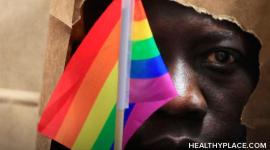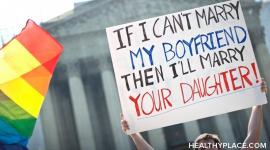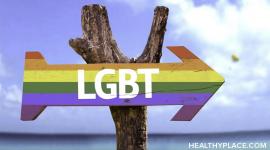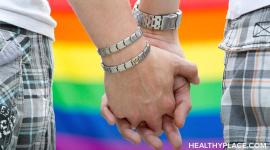When LGBTQIA+ Discrimination, Stigma Affects Your Mental Health
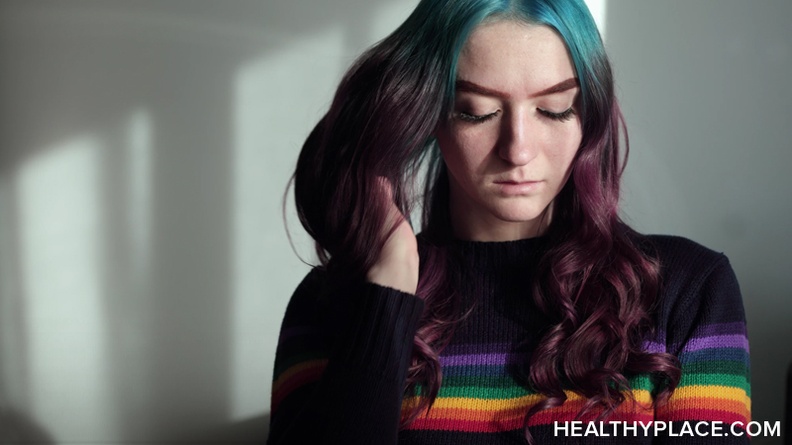
LGBTQIA+ discrimination is real and it has been felt in one way or another by almost every lesbian, gay, bisexual, transgender, queer/questioning, intersex, asexual, etc. (LGBTQIA+) person. LGBTQIA+ discrimination can be seen in almost every aspect of life from housing, to employment, to schooling to family and religion. This type of discrimination is driven by LGBTQIA+ stigma and this type of stigma and discrimination often negatively impacts a person's mental health.
This impact of gay discrimination is seen in the mental illness rates of LGBTQIA+ people. Unfortunately, according to a study, LGB people are about 2.5 times more likely to experience a mental illness in their lifetime.1 This increase is seen in disorders like:
- Panic attacks, obsessive-compulsive and other anxiety disorders
- Depression (Homosexuals and Depression: Help for Gays with Depression)
- Bipolar
- Substance use
- Self-harm, suicidal feelings and actions
You can find more information on LGBT youth and mental health concerns here.
Getting Help for LGBT Stigma-Related Mental Health Issues
What's important to know is that whether you are experiencing anxiety produced by LGBT discrimination experiences or suspect you have a mental illness like depression or bipolar disorder, it's important to get help. This help might come in the form of:
- Emergency help – through a helpline, 9-1-1 or an emergency room. This is critical in the event that you, or another, are in danger.
- Medical help – useful for those that suspect they have a mental illness. This includes doctors like your family doctor or a psychiatrist.
- Psychological help – useful in many cases as counselors and psychologists are trained to deal with both LGBTQIA+ stigma issues and mental health issues.
- A support group – often used in conjunction with other help to support someone through treatment such as addiction treatment.
- Getting help when dealing with the complexity of having LGBTQIA+ discrimination issues mixed in with mental health issues may make the use of an LGBTQIA+ specialist a good idea (see below).
Mental Health Organizations and LGBTQIA+ Stigma
Handling mental health challenges can be difficult at the best of times but it can seem downright impossible in the face of LGBT stigma. Luckily there are gay support resources that can help.
Many mental health organizations are gay-friendly and some even have specialized programs for LGBTQIA+ people. Mental health organizations offer resources like:
- Support and discussion groups
- Research material
- Advocacy
- Counseling
- Educational programs
- Workshops
The biggest mental health organization that also specifically addresses LGBTQIA+ stigma and discrimination is the National Alliance on Mental Illness (NAMI). See here for more information or locate a chapter near you.
Medical Mental Health Help in the Face of LGBT Stigma
While most psychologists and psychiatrists are gay-friendly, there are some doctors, psychologists and counselors that specifically address is the issues, like LGBTQIA+ stigma, that a gay person with mental health challenges might face. To find a medical professional that specializes in treating, educating and advocating for LGBTQIA+ people, see:
- The Association of Gay and Lesbian Psychiatrists
- The Gay and Lesbian Medical Association
- The Association for Lesbian, Gay, Bisexual and Transgender Issues in Counselling
Other Useful LGBTQIA+ Discrimination Mental Health Links
In addition to these organizations, there are other organizations also dedicated to helping mental health consumers dealing with gay and lesbian discrimination:
- The Rainbow Heights Club
- The Trevor Project – which also runs a helpline at 866-488-7386
APA Reference
Tracy, N.
(2022, January 10). When LGBTQIA+ Discrimination, Stigma Affects Your Mental Health, HealthyPlace. Retrieved
on 2025, November 30 from https://www.healthyplace.com/gender/glbt-mental-health/when-lgbt-discrimination-stigma-affects-your-mental-health
